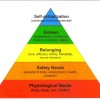
Photo by h.koppdelaney
All our difficult relationships have a common underlying belief. As I hear myself describe a person I’m uncomfortable with, or listen to my clients portray a thorny relationship, with their colleague, spouse or someone else, the theme that I notice consistently present is, ‘I am okay, the other person is not’ – that somehow our perspective is more accurate than the other person’s.
Nilanjan, a technocrat, in his fifties, sounded disappointed while describing his relationship with his wife. He felt that she was whiling away her life; that she was not paying any attention to employing her talents towards engaging in something substantial; that she was neither focused on professional pursuits nor spiritual – the two things Nilanjan was most proud of in his own life.
Mild-mannered Gauri, considered a seriously high-potential talent by her bank, was frustrated with her boss. She found him aggressive and intimidating. According to her, he never fully listened to her ideas, had no respect for her time, and had no consideration for her family commitments. She was also quick to point how she treated her own team members so differently.
The challenge appears outside of us
Most of us tend to externalize our challenges, blaming them on someone else or the circumstances – ‘my boss is too aggressive’, ‘my spouse doesn’t care about me’, or ‘my teenage children don’t listen to me’ and so forth. It comes from the belief that our outlook and behavior are okay and theirs are not; and that if only they could change their ways, we would be in a better place.
The real change is within us
What we fail to recognize in these situations is that the real change is within us. The good news is that when we change, the world around us changes too – or at least the reality we start to experience changes.
We need to realize that our views of others are totally guided by our own limited mindset – our attitudes, perceptions, and beliefs. Anais Nin, the French author, beautifully articulated, “We do not see things as they are. We see them as we are.” It maybe our excessive need to succeed that makes us relate to someone else as less driven; it maybe our meek nature that makes us experience another person as aggressive.
The question I would ask is ‘Is your boss too aggressive or are you not courageous enough?’ ‘Has your spouse stopped caring for you or have you stopped demonstrating your love?’ ‘Have your children stopped listening to you or have you stopped understanding their needs?’ As Carl Jung wisely remarked, “Everything that irritates us about others can lead us to an understanding of ourselves.”
Three keys to healthier relationships
- Stop judging
We judge others all the time and then feel at liberty to label them as self centered, inconsiderate, lazy, aggressive, overambitious, uninteresting, irresponsible and so forth. These labels result in our forming longer-lasting opinions about others and shape the quality of our interactions with them.
Instead, we need to empathize with others, become more open to accepting their differences, in outlook and behavior, as an outcome of their unique make-up. This allows us to depersonalize the situation. Instead of judging them as an angry person, who always gets upset with us, we start to relate to their anger as a reflection of their sadness or challenges in life; instead of seeing them as too controlling, we compassionately accept their insecurities.
Nilanjan, in the above case, benefited a lot from making this shift from judging to accepting and appreciating his wife’s unique outlook towards life.
- Be assertive and authentic
While not judging others allows us to relate better with them, learning to be assertive and authentic supports us to forge deeper relationships. Generally, most of us fall somewhere on a spectrum, ranging from being highly aggressive to highly submissive. Either side of the spectrum is not very healthy.
Aggressive people believe it’s often their right of way, tend to push their point of view strongly, can be loud, and sometimes openly express their anger. Submissive people tend to avoid confrontation, have difficulty saying No, are over-sensitive, and feel uncomfortable expressing their true thoughts and feelings, and so forth.
The ideal place to be, and particularly in the context of healthy relationships, is somewhere in between – where we express ourselves fully, without the need to win; are firm, but polite and respectful; make our point, but are equally open to listening to others; are authentic in our expression, but are sensitive to others’ feelings.
When we are consistently authentic and assertive, others around us naturally shift from their aggressive or submissive style – at least with us. That’s how Gauri eventually created a professional and mutually respectful relationship with her boss.
- Communicate emotions effectively
Finally, with some of our closest and most sensitive relationships, it helps to know how to effectively communicate our difficult emotions to them. As Marshall Rosenberg, a well-known author and psychologist, describes in his book, Non-violent Communication, it stems from taking greater responsibility of our own emotions and recognizing that the feelings we experience are a direct result of how well our needs are being met or not.
Usually, instead of paying attention to our needs that are not being met and how that may be causing us to feel in a certain way, we are quick to point fingers at the other person – arising from the belief that their behavior is the singular source of our unhappy feelings.
The alternate approach then is to acknowledge, without any sense of blame or complain, which of our needs are not being met by the other person’s behavior and how we are feeling as a result. And then, without any insistence on the other person to change their behavior, sensitively share it with them.
For example, Gauri gathered the courage to speak with her boss. After seeking permission to discuss something personal, she shared with him about her need for autonomy and how when he spoke in an aggressive tone, she felt offended.
This approach works for a couple of reasons. First, unlike our instinctive response, there is no judgment or blame being passed on the other person or their behavior. Second, we take ownership of our feelings, by relating them to our own needs. Finally, most people, when sensitized to the needs of others close to them, do make an effort to meet those needs.











 Discovering Your Calling
Discovering Your Calling Domination of Our Senses and Personal Mastery
Domination of Our Senses and Personal Mastery Maslow’s Hierarchy Revisited…the Eastern Way!
Maslow’s Hierarchy Revisited…the Eastern Way! Yes, You Can Rewire Your Brain!
Yes, You Can Rewire Your Brain! Are You A Maximiser Or A Satisficer? The Answer Shapes Your Life
Are You A Maximiser Or A Satisficer? The Answer Shapes Your Life
This article is very useful in dealing with everyday challenges in life – both domestic and professional. It gives a powerful message of the need for introspection to change my own perspective for dealing with issues maturely and constructively without entering into a blame game. Thanks Rajiv.
Excellent article with practical tips that everybody can use. One gets immediate satisfaction to put a blame on others. However, that does not improve the situation and bring any long term change in the relationship. Once we keep our ego aside and understand the need for us to change, then a problem becomes and opportunity!
You article beautifully reinforces the need to strike the balance but also get ones point across.
Ego is a disease and the medicine lies within it too…words of Nanak (Page 466 Guru Granth Sahib)
agree, esp Jung.
Following from his observation, we need to probably accept that some folks / organizations / milieus are NOT for us… we just dont ‘belong’ there at point of time. we need to learn the lesson of ‘who we really are’ from our (unhappy?) experiences and move on to an environment more suited to this. In the process we gain invaluable knowledge of ourselves.
so the line becomes, I’m Ok, You are not – for me, now
A very well understood, researched and articulated subject by you Rajiv…. helps a lot to create perspective in ones own life. I for sure, have had these feelings and experiences and reading this allows me to identify with and introspect on the happenings. Thanks Rajiv.